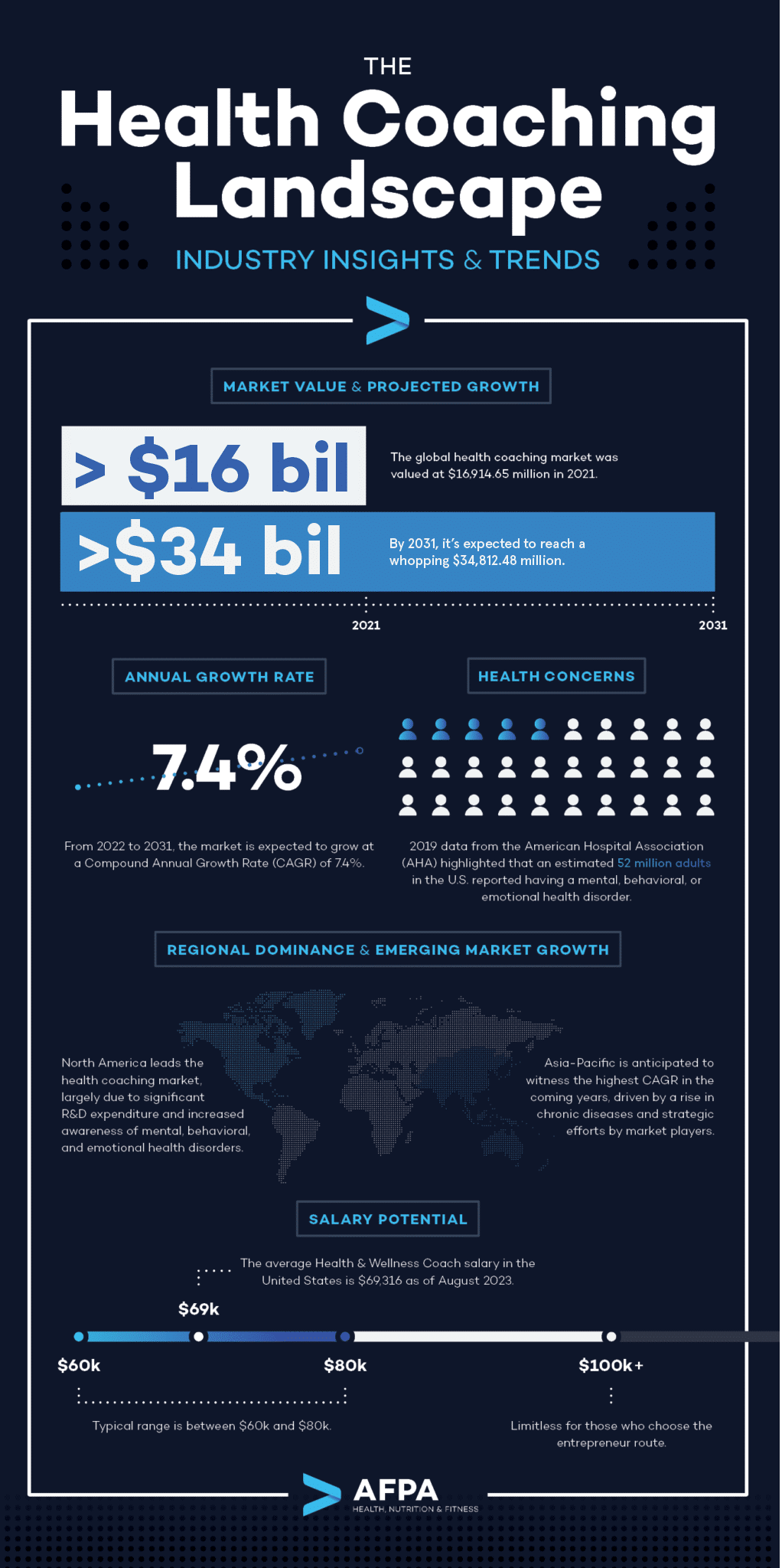In today’s fast-paced world, health is becoming a focal point of concern and attention, not just in terms of traditional medical care but also in comprehensive wellbeing, encompassing mental, emotional, and physical dimensions.
Stepping in to bridge the gap between medical advice and real-world application, health coaching has emerged as a critical pillar in the global health paradigm. This sector offers a harmonious blend of evidence-based strategies with compassionate human interaction, guiding individuals to achieve their wellness goals and manage lifestyle challenges. From the backdrop of the COVID-19 pandemic to the surge in chronic diseases, health coaching’s relevance has been amplified. Through this deep dive, we’ll explore the intricacies of the health coaching market, spanning regions, types of services, applications, and market dynamics.

The Global Health Coaching Market: A Snapshot
Market Size and Projected Growth:
The health coaching sector has seen significant strides, with distinct segments based on type, mode, duration, application, and region showcasing diverse growth patterns. The holistic and wellness health coaching segment asserted its dominance in the market in 2021, indicating a rising global consciousness and the necessity to manage chronic ailments.
Furthermore, the online mode of health coaching, especially in burgeoning economies like India and China, witnessed remarkable growth the same year. Geographically, while North America held the torch in 2021, the upcoming years are projected to witness the Asia-Pacific region pull ahead, fueled by increasing instances of chronic diseases and strategic moves by market leaders.
Learn How to Stand Out as a Top-Tier Health Coach in 5 Steps

Focus Areas and Services:
Health coaches offer a diverse array of services tailored to the unique needs of individuals. Key focus areas often encompass nutrition guidance, physical activity regimens, stress management techniques, and sleep optimization. Beyond these, many coaches provide specialized advice on chronic disease management, holistic wellbeing, nutrition, and behavioral change. National Board-Certified Health and Wellness Coaches demonstrate the highest level of authority and credibility within the industry. Through personalized action plans, health coaches equip individuals with the tools and knowledge to embark on transformative journeys toward improved health, enhanced life quality, and overall wellbeing.
Importance in Current Health Challenges:
The emergence and prominence of health coaching are not mere passing trends but resonate deeply with the evolving health challenges of the modern world. As the specter of chronic diseases looms larger, health coaching emerges as a beacon, offering individuals nuanced strategies to navigate their health concerns.
Concurrently, the world is also witnessing a surge in behavioral health disorders, ranging from substance abuse to conditions like bipolar disorder. This landscape underscores the pressing need for personalized health interventions, spearheaded by adept health coaches. Furthermore, the surging focus on holistic wellness, inclusive of mental health issues like anxiety and depression, only amplifies the role of health coaching. With a dynamic interplay of changing lifestyle patterns, environmental stressors, and a growing chorus around mental health, health coaches stand at the forefront, guiding individuals through these multifaceted challenges.
The Global Health Coaching Market not only mirrors the world’s health challenges but also epitomizes our innovative, collective approach toward health and wellbeing. Through collaborations, acquisitions, and strategic partnerships, this sector is poised to redefine the paradigms of health and wellness in the years to come.
COVID-19 Impact on Health Coaching
The COVID-19 pandemic has indelibly transformed the global landscape in numerous ways, with health and wellness being paramount among them. As the world grappled with an unprecedented health crisis, the resultant socio-economic impacts, and the pervasive sense of uncertainty, there was a discernible surge in the demand for health coaching. This section delves into the nuances of this upswing and the intertwined relationship between the pandemic and the burgeoning health coaching market.
Rising Demand Amidst a Health Crisis:
As countries implemented lockdowns and social distancing measures, people worldwide faced abrupt lifestyle changes, varying from disrupted daily routines to the overwhelming challenges of remote work. Moreover, with fitness centers, yoga studios, and therapy clinics shutting their doors, there emerged a vacuum in the wellness sector. Health coaching seamlessly filled this gap. Offering a blend of physical wellness strategies, dietary guidelines, mental health coping techniques, and lifestyle management tools, health coaches became the go-to experts for many. The transition to virtual platforms further cemented the relevance and accessibility of online health coaching, especially in areas with stringent movement restrictions.
Mental Health Disorders and Market Growth:
The pandemic wasn’t just a physical health crisis; it unveiled a lurking mental health pandemic, too. Isolation, job losses, grief, fear of the virus, and the overarching theme of uncertainty exacerbated mental health disorders globally. Cases of anxiety, depression, and other behavioral health issues witnessed a marked surge.
In this challenging scenario, health coaching emerged as a pivotal ally. With a distinct focus on holistic wellness, health coaches extended their expertise beyond just physical health. They became instrumental in providing coping strategies, stress-reducing techniques, and personalized interventions to those battling mental health challenges.
Moreover, the clear recognition of the intertwining of mental and physical health, a notion underscored by the pandemic, bolstered the demand for holistic and wellness health coaching. The surge in mental health disorders not only accentuated the value proposition of health coaching but also directly contributed to the market’s growth, particularly in the holistic wellness segment.
Chronic Diseases and the Rise of Health Coaching
The modern world, while having its myriad conveniences and advances, is paradoxically seeing a rise in chronic diseases. From diabetes and hypertension to cardiovascular disorders and respiratory conditions, chronic diseases have become the leading cause of death and disability worldwide. With medical interventions often limited to the management of symptoms rather than curing the root cause, the emphasis on preventive care and holistic management has never been more crucial. This is where health coaching has come to play an indispensable role, acting as the bridge between medical intervention and lifestyle modification.
Health Coaching’s Integral Role in Chronic Disease Management:
Health coaching, at its core, is about fostering sustainable behavioral changes that can prevent, manage, and mitigate the impacts of chronic diseases. Given that many chronic diseases are lifestyle-induced, ranging from poor dietary choices to sedentary habits, health coaches offer a more personalized approach that traditional medical interventions often overlook.
Coaches help individuals:
- Understand the implications of their lifestyle choices.
- Set achievable goals related to diet, exercise, stress management, and other determinants of health.
- Craft tailored strategies that take into account individual preferences, routines, and challenges.
- Provide a consistent source of motivation, accountability, and support, ensuring that individuals stay on track and make long-term, sustainable changes.
By focusing on the whole person, health coaching goes beyond just the disease, addressing the myriad factors, from emotional to environmental, that play into an individual’s health.
The Correlation Between Rising Chronic Diseases and Health Coaching Demand
The stark rise in chronic diseases globally can be attributed to a combination of genetic, environmental, and most prominently, behavioral factors. Urbanization, processed food consumption, sedentary lifestyles, and increasing stress levels contribute significantly to this upswing.
As the prevalence of these diseases grows, so does the realization that traditional healthcare, though vital, is only a part of the solution. This awareness has directly contributed to the burgeoning demand for health coaching services. Individuals, now more than ever, are seeking guidance on lifestyle modifications, natural interventions, and preventive measures to either stave off or manage these chronic conditions.
Moreover, the cost of chronic disease management, both financial and personal, is immense. Health coaching offers a cost-effective alternative, focusing on prevention and holistic management, which not only reduces the economic burden on healthcare systems but also greatly improves the quality of life for those affected.
Market Growth and Business Opportunities
The health coaching market has shown consistent growth in recent years, fueled by increased awareness of preventive healthcare and a burgeoning demand for personalized and holistic health solutions. As this industry matures, several business opportunities have become apparent, driven by various socio-economic and geopolitical factors.
Business Opportunities in the Health Coaching Market
- Digital Platforms: With the digital revolution, there’s a growing demand for online health coaching platforms, offering personalized consultations, AI-driven health assessments, and virtual wellness plans. Innovations like mobile apps and wearable devices offer health coaches a chance to extend their reach and provide real-time monitoring and feedback to clients.
- Corporate Wellness Programs: With companies increasingly recognizing the value of a healthy workforce, there’s a surging demand for health coaches within corporate wellness programs. Coaches can provide employees with strategies to manage stress, dietary advice, exercise regimens, and more, contributing to improved productivity and reduced sick days.
- Specialized Coaching: As the field expands, there’s an increasing demand for specialization within health coaching. Whether it’s coaching focused on mental wellness, geriatric health, prenatal care, or specific chronic diseases, niche areas present significant business potential.
Impact of Rising Costs on Market Growth
Rising healthcare costs globally are pushing individuals and corporations toward preventive measures, subsequently boosting the health coaching market. High costs associated with treating chronic diseases, both direct (medical bills) and indirect (loss of productivity), are making health coaching an attractive, cost-effective complement to traditional treatment. Businesses, in particular, are investing in health coaching as a proactive measure to reduce future healthcare expenditures and improve employee wellbeing.
Opportunities in Emerging Nations and the Role of Government Initiatives:
Emerging nations, such as those in Asia-Pacific and Africa, represent vast untapped markets for health coaching. Rapid urbanization, increased exposure to western lifestyles, and a surge in lifestyle-related diseases in these regions present a prime opportunity for health coaching services.
Governments in these nations are actively rolling out initiatives to improve the health of their citizens. In countries like India and China, where the burden of chronic diseases like diabetes and heart conditions is rising sharply, government programs promoting preventive care and wellness are becoming more common.
Collaborations between health coaching providers and governments can lead to widespread awareness campaigns, community-based health coaching programs, and integration of coaching services into public health systems. For businesses, this can translate to partnerships, grants, and an expanded client base.
Types of Health Coaching Services
As the global perspective on health evolves, so does the variety and depth of services offered in the health coaching industry. Among these, holistic health and wellness coaching stands out not just for its comprehensive approach, but also for its dominant presence and projected growth in the market.
Holistic Health and Wellness Coaching:
Holistic health and wellness coaching focuses on the entirety of an individual’s wellbeing, going beyond just physical health. This coaching style emphasizes the interconnections between the body, mind, and spirit. The goal is not just to address specific health challenges but to achieve a balanced state of overall wellness.
Here’s what typically defines holistic health and wellness coaching:
- Comprehensive Approach: Coaches consider all facets of a client’s life, from dietary habits and physical activity to emotional wellbeing and spiritual beliefs. It’s understood that each of these areas can influence the others, so the approach is integrative and tailored to the individual.
- Empowerment: Instead of merely providing advice or prescriptions, holistic coaches empower clients to take charge of their own health. They facilitate self-awareness, helping clients identify patterns, beliefs, and behaviors that may be beneficial or detrimental to their health.
- Addressing Root Causes: Instead of just treating symptoms, holistic health coaching delves deeper to find and address the root causes of health issues. This might involve identifying emotional triggers for unhealthy eating, for instance, or exploring the impacts of stress on physical health.
Dominance and Projected Growth of the Holistic Health and Wellness Coaching Segment
The holistic health and wellness coaching segment has seen substantial growth, cementing its dominance in the health coaching market. Several factors contribute to this growth:
- Increasing Awareness: As the detrimental effects of modern lifestyles become more apparent, there’s a growing realization of the need for comprehensive wellness approaches. People are looking for solutions that consider their whole being, rather than just isolated aspects of health.
- Management of Chronic Diseases: Chronic conditions like diabetes, obesity, and heart diseases require a multifaceted approach. Holistic and wellness health coaching, with its comprehensive perspective, is particularly effective in addressing these conditions.
- Mental Health Concerns: With the rise in mental health disorders globally, there’s a burgeoning demand for holistic interventions. The understanding that mental and physical health are intertwined and influence each other is pushing more individuals toward holistic and wellness coaching.
Given the current trends and increasing demand, the holistic health and wellness coaching segment is poised for significant growth in the coming years. As health challenges become more complex, and as people seek more integrated solutions, this segment of health coaching is expected to flourish even further.
Delivery Modes of Health Coaching
In today’s digitally connected world, health coaching has evolved to cater to individual preferences and needs. Two primary delivery modes dominate the landscape: online and offline. As the demand for health coaching services continues to rise, understanding the nuances of these delivery methods becomes crucial for potential clients and professionals alike.
Online Health Coaching:
The convenience of technology has transformed many sectors, and health coaching is no exception. Online health coaching is a mode where coaching services are offered through digital platforms, such as video calls, mobile apps, chat platforms, and web-based portals. This mode provides:
- Flexibility: Clients can access coaching from anywhere, be it their homes, workplaces, or when traveling.
- Wider Reach: It allows health coaches to serve clients beyond their immediate geographical area.
- Use of Tech Tools: Digital platforms often come equipped with tools for tracking progress, setting reminders, and even integrating with wearable health devices.
Offline Health Coaching:
Traditional face-to-face health coaching (offline coaching) typically occurs in settings such as clinics, gyms, health centers, or wellness retreats. This mode offers:
- Personal Touch: Direct interactions can help build stronger rapport and trust between the coach and the client.
- Real-time Feedback: Immediate feedback during sessions can be beneficial, especially during physical training or demonstrations.
- Tangible Resources: Some offline coaching programs may provide clients with physical resources, like printed material or equipment.
Dominance and Projected Growth of the Online Health Coaching Segment:
Online health coaching has witnessed a surge in recent years, and several factors contribute to its dominance:
- Pandemic Influence: The lockdown during the COVID-19 pandemic and the rise in mental health disorders emphasized the need for accessible health services. The digital platform filled this gap, allowing continuity in health coaching despite physical restrictions.
- Data Insights: The Global Health Coaching Market Size was valued at $16,914.65 million in 2021 and is projected to reach $34,812.48 million by 2031. This significant growth is partially attributed to the increasing demand for online health coaching. For instance, data from the American Hospital Association (AHA) revealed that in 2019, around 52 million adults in the U.S. reported having mental, behavioral, or emotional health disorders. The rising prevalence of these disorders has naturally increased the demand for accessible health coaching services.
- Tech-Savvy Population: With a growing number of tech-savvy individuals, the preference for digital solutions has skyrocketed. Online coaching, with its promise of convenience and adaptability, fits perfectly into this landscape.
Considering these factors, the online health coaching segment’s growth is not just a transient phase but a long-term trend. As technology continues to evolve and as the global community becomes more digitally interconnected, online health coaching is set to play an even more significant role in shaping the future of health and wellness.
Applications of Health Coaching
Health coaching, with its holistic approach, addresses various aspects of health, including physical, emotional, and behavioral facets. Through personalized guidance and actionable strategies, health coaches empower clients to make sustainable, positive changes in their lives. The primary applications of health coaching can be categorized into three main areas: general wellness, behavioral health, and chronic disease management.
General Wellness:
General wellness encompasses a broad spectrum of health aspects, ranging from maintaining a balanced diet and regular exercise to stress management and sleep hygiene. Here’s how health coaching plays a pivotal role:
- Lifestyle Guidance: Coaches provide insights and strategies tailored to individual needs, helping clients achieve a balanced lifestyle.
- Preventive Measures: By promoting healthy habits, health coaching plays a proactive role in disease prevention.
- Enhanced Wellbeing: Coaches often provide tools and techniques to boost mental and emotional wellbeing, fostering overall life satisfaction.
Behavioral Health:
Behavioral health specifically deals with habits, behaviors, and decisions related to an individual’s wellbeing. Health coaching in this sphere involves:
- Substance Abuse Management: Coaches guide clients through their recovery journey, helping them resist cravings and build healthier habits.
- Mental Health Support: Though not replacements for mental health therapists, health coaches offer tools and strategies to cope with challenges.
- Positive Behavior Reinforcement: Health coaches help instill positive behaviors while helping clients steer clear of detrimental habits.
Chronic Disease Management:
For individuals diagnosed with chronic ailments, health coaching can be transformative. It involves:
- Tailored Plans: Based on specific diseases, coaches develop personalized plans, be it for diabetes, cardiovascular issues, or any other chronic condition.
- Disease Education: Clients gain a deeper understanding of their ailment, making them more proactive in managing their health.
- Lifestyle Integration: Coaches guide clients in seamlessly integrating disease management practices into their daily routines, ensuring long-term adherence.
Dominance and Projected Growth of the General Wellness Segment
Of these applications, general wellness has emerged as the dominant segment in health coaching. The rising awareness of preventive health measures, coupled with an increasing global emphasis on holistic wellbeing, has catapulted general wellness to the forefront.
Several factors contribute to the dominance and projected growth of this segment:
- Holistic Health Trend: The contemporary health narrative has shifted from disease prevention to achieving holistic wellbeing, encompassing physical, mental, and emotional health.
- Accessibility: With the digital boom, health and wellness information and guidance have become more accessible, fostering a proactive approach to health.
- Global Stressors: Modern-day challenges, including the stresses of urban living and work-related pressures, have heightened the demand for general wellness coaching.
Given these trends and the undeniable benefits of prioritizing overall wellbeing, the general wellness segment is poised for sustained growth in the coming years. As individuals recognize the value of comprehensive health, general wellness coaching will undoubtedly remain a focal point in the global health industry’s future trajectory.
Regional Analysis of the Health Coaching Market
The global health coaching industry has displayed varying trends and market dynamics across different regions. While North America has held the pole position for a while, emerging economies are quickly catching up, with Asia-Pacific poised for remarkable growth in the foreseeable future. In this section, we delve deeper into the regional nuances of the health coaching market.
North America (U.S., Canada, and Mexico):
North America has remained the epicenter of the health coaching industry for several reasons:
- Research and Development: The region boasts of high expenditure in R&D activities, ensuring innovative and effective coaching methodologies.
- Awareness Levels: The heightened awareness of mental and behavioral health disorders, particularly in countries like the U.S., propels the demand for health coaching services.
Given these factors, North America is projected to retain its dominance in the health coaching market throughout the forecast period.
Europe (Germany, France, the UK, Italy, Spain, and the Rest of Europe):
Europe, with its advanced healthcare systems and high levels of health awareness, has seen steady growth in the health coaching sector. Countries like Germany and the UK have experienced increased demand, primarily due to their aging populations and the associated health challenges.
Asia-Pacific (Japan, China, Australia, India, South Korea, and Rest of Asia-Pacific):
Asia-Pacific is the dark horse in the global health coaching landscape:
- Chronic Disease Prevalence: An escalating number of patients with chronic diseases, such as diabetes and obesity, particularly in countries like India and China, is driving the demand for health coaching services.
- Market Strategies: The region is witnessing innovative approaches by market players, such as collaborations and acquisitions, to meet the surging demand.
Given these dynamics, Asia-Pacific is slated to experience the highest CAGR during the analysis period, positioning it as a key growth engine for the global health coaching market.
LAMEA (Brazil, South Africa, Saudi Arabia, and Rest of LAMEA):
LAMEA, which comprises a mix of developing economies, is in the nascent stages of health coaching adoption. While countries like Brazil and South Africa are slowly warming up to the concept, there’s ample room for growth, especially with targeted awareness campaigns and strategic market interventions.
Dominance of North America and the Anticipated Growth of Asia-Pacific:
In 2021, the torchbearer for the health coaching industry was undoubtedly North America, primarily due to its robust R&D landscape and heightened awareness levels. However, Asia-Pacific, with its vast population and rising health challenges, represents a goldmine of opportunities. The escalating prevalence of chronic diseases and strategic market interventions ensures that Asia-Pacific is on track to register rapid growth, potentially reshaping the global health coaching market in the coming years.
Main Takeaways
The health coaching industry has witnessed a remarkable evolution, solidifying its critical role in the contemporary health paradigm. As of 2021, its market valuation stood impressively at $16,914.65 million, with projections indicating a surge to $34,812.48 million by 2031. This anticipated growth, which translates to a CAGR of 7.4% from 2022 to 2031, is spurred by a confluence of factors including rising global awareness, escalating incidences of mental and behavioral health disorders, and a heightened prevalence of chronic diseases.
Transitioning from the fringes to the core, health coaching has proven to be more than just a supplementary healthcare service. It offers individuals tailored, actionable strategies that promote healthier lifestyle decisions, holistic wellbeing, and proactive health management. This emphasis on personalized care makes health coaching not just a booming professional field, but a meaningful vocation. Aspiring health coaches are presented with an opportune moment to join this burgeoning sector, especially as emerging markets present untapped potential.
For individuals contemplating the adoption of health coaching services, the advantages are manifold. Beyond just achieving wellness milestones like weight management or stress reduction, health coaches guide individuals on transformative journeys toward overall health. Those eager to delve deeper into this field’s intricacies and potential are encouraged to explore specialized industry reports, such as those curated by Allied Market Research, or immerse themselves in health coaching communities for authentic insights. In this evolving health landscape, health coaching emerges not just as a trend but as a beacon guiding individuals toward enhanced wellbeing.

Learn How to Set Yourself Apart as a Board-Certified Health Coach
References
https://www.alliedmarketresearch.com/health-coaching-market-A13404
https://blog.gitnux.com/health-coaching-industry-statistics/
https://www.sciencedirect.com/science/article/pii/S073839911730246X
https://www.sciencedirect.com/science/article/abs/pii/S0738399114003000
https://dl.acm.org/doi/abs/10.1145/3290605.3300900
https://www.mdpi.com/1660-4601/19/20/13447



